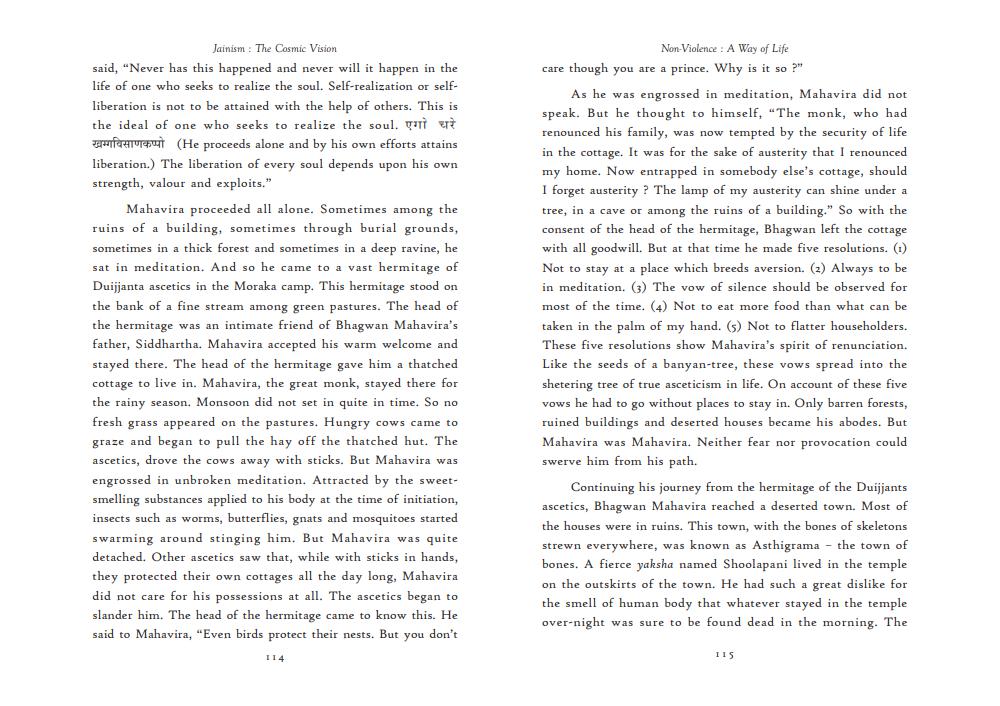________________
Jainism: The Cosmic Vision said, "Never has this happened and never will it happen in the life of one who seeks to realize the soul. Self-realization or selfliberation is not to be attained with the help of others. This is the ideal of one who seeks to realize the soul. Tri vrt aferet (He proceeds alone and by his own efforts attains liberation.) The liberation of every soul depends upon his own strength, valour and exploits."
Mahavira proceeded all alone. Sometimes among the ruins of a building, sometimes through burial grounds, sometimes in a thick forest and sometimes in a deep ravine, he sat in meditation. And so he came to a vast hermitage of Duijjanta ascetics in the Moraka camp. This hermitage stood on the bank of a fine stream among green pastures. The head of the hermitage was an intimate friend of Bhagwan Mahavira's father, Siddhartha. Mahavira accepted his warm welcome and stayed there. The head of the hermitage gave him a thatched cottage to live in. Mahavira, the great monk, stayed there for the rainy season, Monsoon did not set in quite in time. So no fresh grass appeared on the pastures. Hungry cows came to graze and began to pull the hay off the thatched hut. The ascetics, drove the cows away with sticks. But Mahavira was engrossed in unbroken meditation. Attracted by the sweetsmelling substances applied to his body at the time of initiation, insects such as worms, butterflies, gnats and mosquitoes started swarming around stinging him. But Mahavira was quite detached. Other ascetics saw that, while with sticks in hands, they protected their own cottages all the day long, Mahavira did not care for his possessions at all. The ascetics began to slander him. The head of the hermitage came to know this. He said to Mahavira, "Even birds protect their nests. But you don't
Non-Violence : A Way of Life care though you are a prince. Why is it so ?"
As he was engrossed in meditation, Mahavira did not speak. But he thought to himself, "The monk, who had renounced his family, was now tempted by the security of life in the cottage. It was for the sake of austerity that I renounced my home. Now entrapped in somebody else's cottage, should I forget austerity? The lamp of my austerity can shine under a tree, in a cave or among the ruins of a building." So with the consent of the head of the hermitage, Bhagwan left the cottage with all goodwill. But at that time he made five resolutions. (1) Not to stay at a place which breeds aversion. (2) Always to be in meditation. (3) The vow of silence should be observed for most of the time. (4) Not to eat more food than what can be taken in the palm of my hand. (s) Not to flatter householders. These five resolutions show Mahavira's spirit of renunciation. Like the seeds of a banyan-tree, these vows spread into the shetering tree of true asceticism in life. On account of these five vows he had to go without places to stay in. Only barren forests, ruined buildings and deserted houses became his abodes. But Mahavira was Mahavira. Neither fear nor provocation could swerve him from his path.
Continuing his journey from the hermitage of the Duijjants ascetics, Bhagwan Mahavira reached a deserted town. Most of the houses were in ruins. This town, with the bones of skeletons strewn everywhere, was known as Asthigrama - the town of bones. A fierce yaksha named Shoolapani lived in the temple on the outskirts of the town. He had such a great dislike for the smell of human body that whatever stayed in the temple over-night was sure to be found dead in the morning. The
114
I15




